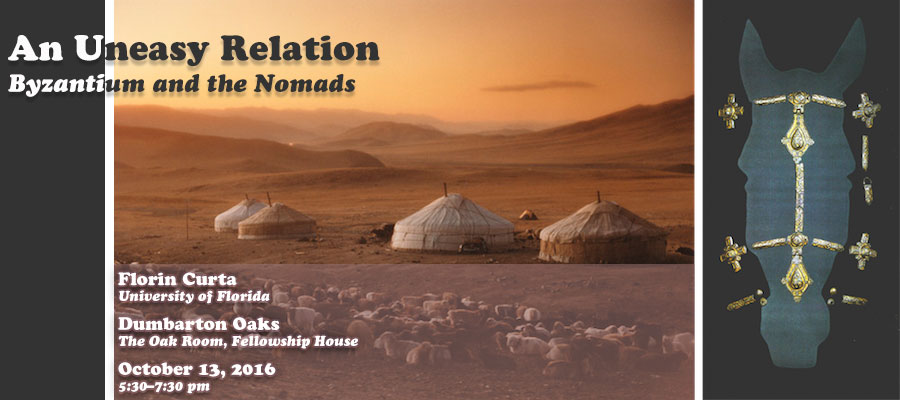An Uneasy Relation: Byzantium and the Nomads, lecture by Florin Curta (University of Florida), Dumbarton Oaks, The Oak Room, Fellowship House, 1700 Wisconsin Avenue, October 13, 2016, 5:30–7:30 pm
Although the relations between the nomads and Byzantium have been the subject of many studies, there is to date no comprehensive treatment of the topic. Byzantine sources provide abundant information about how the imperial government in Constantinople dealt with the peoples inhabiting the steppe lands north of the Black and Caspian Seas. Conclusions drawn on the basis of written sources, however, differ from those resulting from archaeological excavations. New evidence from excavations has enriched our understanding of relations between nomadic and settled communities and has questioned the pigeonholing of diverse communities into preconceived ethnic categories such as “Pechenegs,” “Oghuz,” and “Cumans.”
Recent research has moved beyond the study of burial mounds to focus on the cultures of those nomads who moved into areas neighboring the Byzantine Empire or into Hungary between the eleventh and the thirteenth centuries. These studies have emphasized the processes of sedentization, conversion to Christianity, and eventual assimilation. The study of local settlements in the Balkans has revealed great differences between their relations with sedentary populations north and south of the Danube. Pioneering research in bioarchaeology has only begun to enrich the already complex picture of the archaeology of medieval nomadism in Eastern Europe.
Florin Curta is professor of medieval history and archaeology at the University of Florida. His books include The Making of the Slavs: History and Archaeology of the Lower Danube Region, ca. 500–700 (Cambridge, 2001), which received the Herbert Baxter Adams Award of the American Historical Association; Southeastern Europe in the Middle Ages, 500–1250 (Cambridge, 2006); and The Edinburgh History of the Greeks, c. 500 to 1050 (Edinburgh, 2011). Curta is the editor of five volumes, most recently The Steppe Lands and the World Beyond Them: Studies in Honor of Victor Spinei on His 70th Birthday (Iaşi, 2013), and he is also the editor in chief of the Brill series East Central and Eastern Europe in the Middle Ages, 450–1450.
